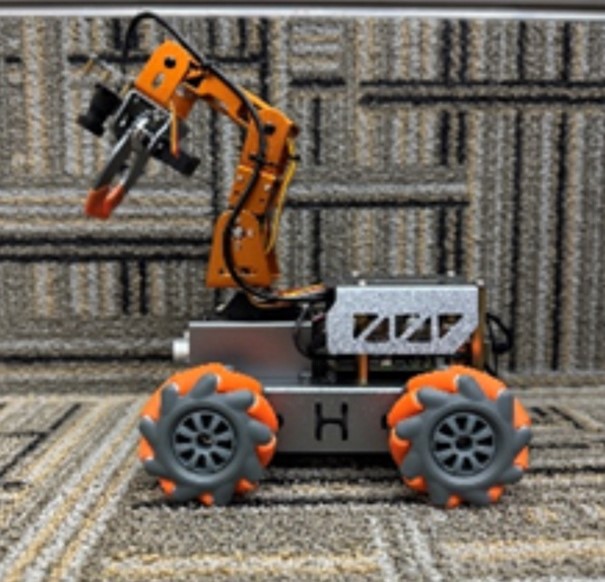About Master Pi Robotic Kit:
The Master Pi Robotic Kit offers a cost-effective and scalable platform for robotics education and research. Built around the Raspberry Pi architecture, it features a compact design with modular components, including a high-resolution camera, ultrasonic sensors, IMU, encoders, and line-followers—making it ideal for autonomous navigation, vision processing, and real-time control. The open-source software ecosystem (Python, OpenCV, TensorFlow Lite, ROS) combined with hardware extensibility allows users to build highly customized solutions for both foundational learning and high-end experimentation. This balance of affordability and capability makes Master Pi an ideal tool for academic institutions, robotics labs, and STEM outreach programs.
Scientific or Technical Area:
Robotics, Sensing, and Artificial Intelligence.
Project Timeline:
Ongoing.
Main Objectives of the Project:
- Remotely controlled operation of the robotic platform.
- Conversion to fully autonomous mode.
- Ai-Based Computer Vision system development.
Anticipated Impact and Relevance:
Introduction to Robotics Classes at Qatar University
At Qatar University, the Introduction to Robotics course incorporates the Master Pi kit as a hands-on platform to support conceptual learning. Students explore key robotics topics such as:
- Kinematics and motion control
- Sensor fusion and real-time feedback vAutonomous line-following and obstacle avoidance
- Camera-based perception and vision-based navigation
The kit’s plug-and-play architecture, built-in wireless connectivity, and support for high-level programming make it especially well-suited for large classroom environments. Students are encouraged to experiment independently, enhancing problem-solving skills, collaborative design, and interdisciplinary learning. With minimal setup and low maintenance, the platform provides a smooth introduction to real-world robotics prototyping.
Master Pi in Research
Beyond coursework, the Master Pi kit is used extensively in undergraduate and graduate-level research at Qatar University. Key applications include:
- Swarm Robotics Research: Teams of Master Pi bots are coordinated using ROS to study decentralized decision-making, behavior emergence, and collective navigation.
- Advanced SLAM and Mapping: Researchers use onboard cameras and IMU fusion for implementing real-time visual SLAM, testing algorithms like ORB-SLAM2 and RTAB-Map in indoor testbeds.
- Vision-Based Robotics: Projects utilize OpenCV for tasks like QR code navigation, facial detection, depth estimation, and augmented reality feedback.
- Edge AI & Embedded Deep Learning: The lightweight architecture of the Master Pi supports TinyML, TensorFlow Lite, and MobileNet inference, making it suitable for deploying on-device AI models for gesture control, object classification, and environmental awareness.
These applications demonstrate the Master Pi’s role not just as a teaching tool but as a credible research instrument capable of driving innovation in the domains of smart mobility, human-robot interaction, and autonomous systems.
Future Directions
Looking ahead, the utilization and impact of the Master Pi kit can be greatly expanded through the following avenues:
Educational Expansion
- Curriculum Integration across Departments: Broaden use beyond engineering—into computer science, healthcare engineering, and AI courses—promoting cross-disciplinary exposure.
- Capstone and Final-Year Projects: Encourage students to build fully autonomous systems using Master Pi as a base platform for real-world applications (e.g., delivery bots, surveillance units, and AI teaching aids).
Research Directions
- Federated Learning in Swarm Environments: Investigate distributed learning where multiple Master Pi bots collaborate to train models without sharing raw data.
- Human-Robot Interaction Studies: Use the onboard camera and microphone to study emotion detection, gesture-based control, and verbal interaction using NLP tools.
- Reinforcement Learning for Control: Implement lightweight RL algorithms for self-learning control policies and dynamic navigation tasks.
Hardware Expansion
Add-ons like:
- Application-based Sensors
- Depth cameras (e.g., RealSense or LiDAR)
- Grippers and servos for mobile manipulation
- Modular battery and solar systems for field testing
Self-Learning and Autonomous Skill Acquisition
- Develop a self-learning curriculum where Master Pi bots collect and analyze their own performance data, adapting control and behavior models via onboard learning.
- Enable cloud-syncing of learning experiences, allowing distributed robots to share models and strategies for collaborative improvement.
Students’ involvement is a key aspect of this project that guarantees Capacity building and developing of local expertise in a number of areas that will impact the industrial and economic footprints in Qatar, essentially aligning with Qatar Vision 2030.
Supervisor(s) Details:
- Full Name: Prof. Uvais Qidwai
- Job Title/Position: Professor (Computer Engineering)
- Department or Unit: Department of Computer Science and Engineering
- Institution/Affiliation: Qatar University
- Email Address: uqidwai@qu.edu.qa
Team Members Involved:
- Dr. Noora Al-Qahtani, Research Assistant Professor, Centre for Advanced Materials (CAM)
- Abdulnaser Rabie, Bachelor Student, Computer Science and Engineering, College of Engineering
- Faris Khalil, Bachelor Student, Computer Science and Engineering, College of Engineering
- Mohamed Walid Farag, Bachelor Student, Computer Science and Engineering, College of Engineering
- Syed Hamza, Bachelor Student, Computer Science and Engineering, College of Engineering
- Rufus John Kurian, Bachelor Student, Computer Science and Engineering, College of Engineering
Picture of the Prototype:
